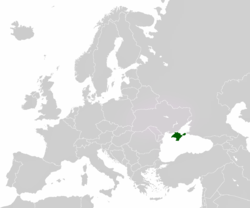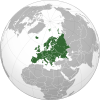Republic of Crimea (country)
It has been suggested that this article be merged into Republic of Crimea. (Discuss) Proposed since March 2014. |
Republic of Crimea Республика Крым Къырым Джумхуриети Республіка Крим | |||||||||||||
|---|---|---|---|---|---|---|---|---|---|---|---|---|---|
| 2014–2014 | |||||||||||||
| Motto: "Процветание в единстве" (Russian) Protsvetanie v yedinstve (transliteration) "Prosperity in unity" | |||||||||||||
| Anthem: "Нивы и горы твои волшебны, Родина" (Russian) Nivy i gory tvoi volshebny, Rodina (transliteration) Your fields and mountains are magical, Motherland | |||||||||||||
 Location of the Crimean peninsula (green) in Europe | |||||||||||||
| Capital | Simferopol 44°57′N 34°06′E / 44.950°N 34.100°E | ||||||||||||
| Common languages | |||||||||||||
| Government | Republic[1] | ||||||||||||
| Legislature | Crimean Parliament | ||||||||||||
| History | |||||||||||||
| 11 March 2014 | |||||||||||||
| 16 March 2014 | |||||||||||||
| 17 March 2014[2][3] | |||||||||||||
| 17 March 2014 | |||||||||||||
| 18 March 2014[4][5][6] | |||||||||||||
• Ratification | 21 March 2014 | ||||||||||||
| Area | |||||||||||||
| Total | 26,100 km2 (10,100 sq mi) | ||||||||||||
| 2007 | 26,100 km2 (10,100 sq mi) | ||||||||||||
| Population | |||||||||||||
• 2007 | 2,352,385 | ||||||||||||
| |||||||||||||
The Republic of Crimea (Russian: Республика Крым; Crimean Tatar: Къырым Джумхуриети, Qırım Cumhuriyeti; Ukrainian: Республіка Крим) was a short-lived, partially recognized sovereign state that claimed the entirety of the Crimean Peninsula in the Black Sea, south of Ukraine and west of southern Russia. The country was established for a little more than a day as a result of the 2014 Crimean referendum,[7] before it was joined to Russia as one of its republics.[4][5][6][8][9] The incorporation of Crimea into Russia was not generally recognized internationally.
The country was formed as the unification of the Autonomous Republic of Crimea and the city of Sevastopol—recognized internationally as administrative divisions of Ukraine—into a single united nation. Both regions had previously adopted a joint resolution expressing their intention to declare independence, as well as a resolution expressing their intention to unite with Russia. For this purpose, both governments had called for a referendum. While the majority of those voting in the controversial referendum voted for independence from Ukraine, internationally the legitimacy and impartiality of the vote was not recognized, particularly since it took place in a situation of a purported Russian occupation of the peninsula. One day after the referendum, both regions united and declared their independence as a single nation. Russia recognized the sovereignty of the newly formed nation the same day.[10] The republic applied to join the Russian Federation as a federal subject at the same time its leaders declared independence,[11] and Russian authorities quickly started the process of admitting Crimea and Sevastopol.[12]
On March 21, 2014 the Russian Federation Council ratified the accession treaty,[13] and President Vladimir Putin signed the treaty into effect that same day, with the accession backdated to March 18.[14]
The recently installed government of Ukraine, along with all sovereign states except Russia, did not recognize the Republic of Crimea's claim to sovereignty, nor the unification of the Autonomous Republic of Crimea with Sevastopol, nor the referendum that paved the way for Crimean secession.
History
Formerly annexed by the Russian Empire, Crimea was reoccupied by the Soviet Russia in 1921 and was granted the status of autonomous republic. After the World War II in 1945 the Soviet authorities deported the indigenous population of Crimean Tatars and the autonomous status of the region was stripped. In 1954, the Presidium of the Supreme Soviet of the Soviet Union transferred the region to Ukraine. Ukraine restored Crimea's autonomous status in 1991 and allowed all Crimean Tatars to return. Crimea's autonomous status was further reiterated in 1996 with the ratification of Ukraine's current constitution, which declared Crimea to be the "Autonomous Republic of Crimea", but also an "inseparable constituent part of Ukraine."[15]
On March 11, 2014, amidst the 2014 Crimean crisis, the Crimean parliament and the Sevastopol City Council issued a letter of intent to unilaterally declare independence from Ukraine.[1] The document specifically mentioned Kosovo as a precedent in the lead part.[1]
The declaration was done in an attempt to legitimize a referendum on the status of Crimea where citizens were to vote on whether Crimea should apply to join Russia as a federal subject of the Russian Federation, or remain part of Ukraine.
Referendum
On March 16, 2014, a large majority (reported as 95% of those who voted) voted in favour of independence of Crimea from Ukraine and joining Russia as a federal subject.[16][17] The BBC reported that most of the Crimean Tatars that they interviewed were boycotting the vote.[16] Prime Minister Sergey Aksyonov stated that 40% of Crimean Tatars took part in the referendum, and according to Russian state media, polling data showed a majority of Tatars in Sevastopol voted to join Russia, with a turnout of over 50% in the city.[18] The European Union, Japan and the United States condemned the vote as illegal.[16][19]
After the referendum, Crimean lawmakers formally voted both to secede from Ukraine and ask for membership in the Russian Federation. The Sevastopol City Council, however, requested the port's separate admission as a federal city.[20]
International recognition
As of March 18, the only UN state to recognize the Republic of Crimea's independence was Russia.[21]
On March 18, 2014, Russia and Crimea signed a treaty of accession of the Republic of Crimea and Sevastopol in the Russian Federation following President Putin’s address to the Parliament. The treaty will enter into force upon ratification.[22] During the transition period which will last till January 1, 2015, both sides will resolve the issues of integration of the new subjects “in the economic, financial, credit and legal system of the Russian Federation.”[23]
On March 23, 2014, Belarus recognized Crimea as de-facto part of Russia. [24]
See also
- Declaration of Independence of the Republic of Crimea
- International recognition of the Republic of Crimea
- Kosovo independence precedent
- List of shortest-lived sovereign states
References
- ^ a b c "Парламент Крыма принял Декларацию о независимости АРК и г. Севастополя". Государственный Совет Республики Крым. March 11, 2014. Retrieved March 18, 2014.
- ^ Marie-Louise Gumuchian (March 17, 2014). "Crimea votes to break from Ukraine, join Russia. What happens next?". CNN. Retrieved March 17, 2014.
On Monday, lawmakers in Crimea approved a resolution that declared the Black Sea peninsula an independent, sovereign state. They then filed an appeal to join the Russian Federation.
- ^ "Crimea votes to join Russian Federation: 96.77% say YES". RT.
Crimea was declared an independent sovereign state, the Republic of Crimea, on Monday, the autonomous Ukrainian regional parliament's website stated. The Supreme Council of Crimea unanimously voted to integrate of the region into Russia.
- ^ a b "Ukraine Liveblog Day 29: Russia Annexes Crimea". The Interpreter. March 18, 2014. Retrieved March 22, 2014.
- ^ a b "Vladimir Putin signs treaty to annex Crimea". Financial Times. March 18, 2014. Retrieved March 22, 2014.
- ^ a b "Putin signs laws on reunification of Republic of Crimea and Sevastopol with Russia". ITAR-TASS. March 21, 2014. Retrieved March 22, 2014.
- ^ "Russia's Vladimir Putin recognises Crimea as nation". BBC News. March 17, 2014. Retrieved March 22, 2014.
- ^ "Putin Reclaims Crimea for Russia and Bitterly Denounces the West". The New York Times. March 18, 2014. Retrieved March 22, 2014.
- ^ "Putin signs treaty making Crimea, Sevastopol part of Russia". Haaretz. March 18, 2014. Retrieved March 22, 2014.
- ^ http://en.ria.ru/russia/20140317/188525924/Russia-Recognizes-Crimeas-Independence.html
- ^ "Ukraine 'will never accept' Crimea annexation, President says". CNN. Retrieved March 17, 2014.
- ^ "Ukraine crisis: Putin signs Russia-Crimea treaty". BBC News. Retrieved March 18, 2014.
- ^ "Russian Federation Council ratifies treaty on Crimea's entry to Russia". ITAR TASS. March 21, 2014. Retrieved March 21, 2014.
- ^ "Putin signs laws on reunification of Republic of Crimea and Sevastopol with Russia". ITAR TASS. March 21, 2014. Retrieved March 21, 2014.
- ^ "Constitution of Ukraine, 1996". Retrieved March 12, 2014.
- ^ a b c BBC News - Crimea referendum: Voters 'back Russia union'
- ^ Crimeans vote over 90 percent to quit Ukraine for Russia | Reuters
- ^ "About 40% of Crimean Tatars take part in Crimean referendum – Prime Minister". ITAR-TASS. March 16, 2014. Retrieved March 16, 2014.
- ^ Japan does not recognise Crimea vote - govt spokesman | Reuters
- ^ "Lawmakers in Crimea Move Swiftly to Split From Ukraine". The New York Times. March 17, 2014. Retrieved March 17, 2014.
- ^ "Executive Order on recognising Republic of Crimea". Kremlin. March 17, 2014. Retrieved March 17, 2014.
- ^ http://en.itar-tass.com/russia/724537
- ^ "Treaty to accept Crimea, Sevastopol to Russian Federation signed". Russia Today. March 18, 2014.
- ^ "Belarusian president: Crimea is de-facto part of Russia". Russia Today. March 23, 2014.
External links



